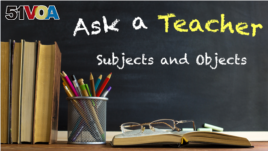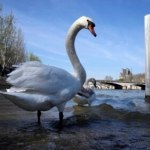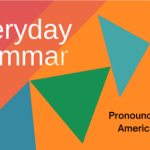14 April 2023
Hello! This week on Ask a Teacher, we will answer a question about subjects and objects.
Question:
Hello VOA Learning English, I am Noormohammed from Saudi Arabia. I have a question about subjects and objects in sentences. Are they the same thing?

Ask a Teacher: Subjects and Objects
Thanks,
Noormohammed.
Answer
Thanks for writing to us, Noormohammed.
Subjects and objects are not the same thing in English language sentences. But they both involve nouns within the structure of a sentence. Let's take a closer look at each to see how they work.
The subject of a sentence causes the action described by the verb. Nouns, pronouns and noun phrases are mainly used as subjects. Here is a simple example:
The cat sleeps.
"The cat" is a noun phrase and the subject of this sentence. The verb is "sleeps." Subjects almost always come before their verbs in sentences.
Other kinds of phrases can also become subjects of sentences.
For example, a verb phrase can become a subject. One kind of verbal phrase is called a gerund, the "ing" form of a verb. It acts as a noun. This means that it can be the subject of a sentence.
Walking is a great form of exercise.
In this sentence, "walking" is a gerund and is the subject. It is not a verb.
Other grammatical forms can be subjects too, like noun clauses and prepositional phrases.
Now let's move onto objects.
An object is another part of the sentence. Objects come after verbs. We say that the object of a sentence receives the action of the verb or that the verb affects the object in some way.
Objects are always nouns or noun phrases. This is something that is shared between the subject of the sentence and the object, but the two are not the same.
Here is a simple example of an object:
The cat eats food.
In this sentence, "food" is the object. The "food" receives the action from the cat — it gets eaten. This makes "food" the direct object. It comes after the verb, and it is directly affected by the action of the verb.
Here are some more examples of direct objects:
I love drinking tea in the morning.
Remember how gerunds act like nouns? Here the verb phrase "drinking tea" is the object.
We ate Thai food last night.
Here the noun phrase "Thai food" is the direct object.
I baked Masha a cake.
Here the direct object of the sentence is "a cake." But what about the other noun that comes right after the verb in the sentence?
"Masha" is the indirect object. Indirect objects are affected by the direct object and not the verb. Indirect objects need a direct object.
So, in this sentence, we did not bake Masha; we baked the cake for Masha.
Here are a few sentences to practice. Find the subject and the object (direct and/or indirect).
Write your answers below in the comments or send us an email at learningenglish@voanews.com.
Walking up too many hills hurts Oliver's back.
We made our parents breakfast.
Abdul bought his wife a new car.
She writes long letters every month.
Please let us know if these explanations and examples have helped you, Noormohammed.
What question do you have about American English? Send us an email at learningenglish@voanews.com
And that's Ask a Teacher.
I'm Faith Pirlo.
Faith Pirlo wrote this lesson for VOA Learning English.
_____
Words in This Story
phrase – n. two or more words that do not form a complete sentence but that express an idea
clause – n. (grammar) a part of a sentence that has its own subject and verb
cake – n. a soft, sweet food made from a heated mixture of flour, sugar, eggs and butter.











